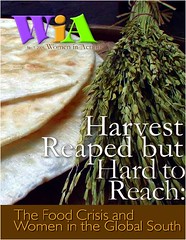[The following is from the flyer of ISIS about its new publication to which AFA contributed articles as follow: “Pursuing Organic Farming in Cambodia” (by Kong Sokchhoin, FNN); “A Case for Cassava in East Nusa Tenggara” (by Nuruddin); “When Survival of the Self is the Survival of Others” (by Ryoko Tsuboi, AINOUKAI); “Bracing the Burdens of Bulan” (by Mela Gipanao, LAKAMBINI/PAKISAMA); “Accessing and Accounting ASEAN” (by Esther Penunia, AFA).]
In 2008, the world was alarmed by the shortage of food especially staples such as wheat, rice and corn. This crunch was further aggravated by the soaring prices of fuel and now, by the gripping economic and climate crises.
But the food crisis is not the result of the unavailability of food sources. Instead it exposed the flaws of the neoliberal model that has created various forms of scarcity amid abundance in the name of profit — resulting to captive politics, massive poverty, environmental degradation and even cultural homogenisation.
Moreover, the food crisis has left of its mark on women’s lives and bodies, which borne much of the pressure to access the already limited resources for the poor and provide for their families.
This Women in Action issue, Harvest Reaped but Hard to Reach: The Food Crisis and Women in the Global South aims to strengthen a Southern gender analysis on the food crisis and its various manifestations in the lived experiences of women and communities, as farmers, fisherfolk, indigenous peoples, activists and scholars. It takes a critical look at the policies, programmes and practical interventions by states and development agencies as well as the responses and interventions of feminist and other social movements and more importantly, grassroots women themselves.
It shares the stories of struggles of women from Argentina, Armenia, Bangladesh, Bolivia, Brazil, Cambodia, China, Ecuador, Fiji, Guatamela, India, Indonesia, Italy, Japan, Kenya, Laos, Nicaragua, Philippines, South Africa, Thailand, the United States and Vietnam. These stories features women’s determination to rise above the crisis and make a difference in their own ways.
This issue also includes the critiques of scholars and activists such as Marilee Karl, Reihana Mohideen, Elenita Daño and Walden Bello.
Copies are available at the Isis Office for PHP 100 and for international subscribers, US$10 which is inclusive of mailing.
For more information, please contact Ms. Elvira Colobong at elvie@isiswomen.org.




Comments are closed